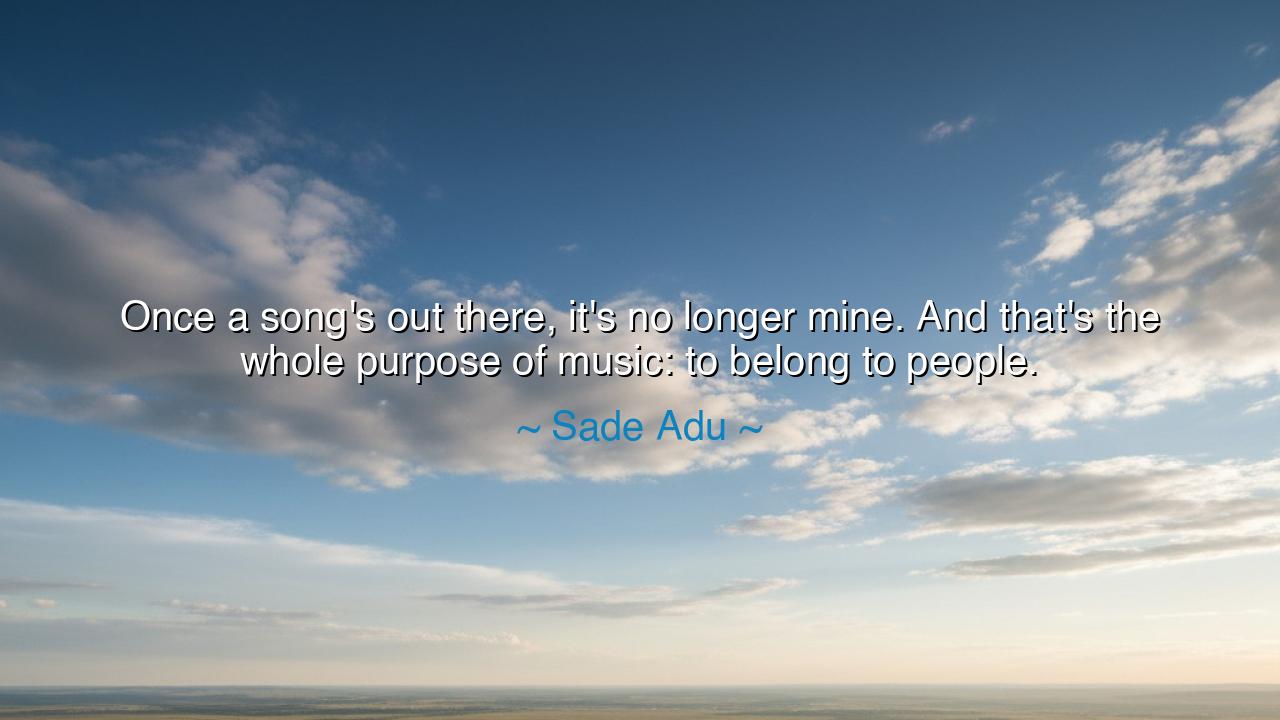
Once a song's out there, it's no longer mine. And that's the
Once a song's out there, it's no longer mine. And that's the whole purpose of music: to belong to people.






Hear the tender wisdom of Sade Adu, who once said: “Once a song's out there, it's no longer mine. And that's the whole purpose of music: to belong to people.” These words echo like the plucking of a timeless harp, carrying with them the truth that art, once created, ceases to dwell in the heart of the maker alone. It is born of the soul, yes, but its destiny is not to remain confined—it is to take flight, to travel across lands and hearts, to become the possession of all who hear it.
For music is not the property of one voice, nor the treasure of one hand. It is like fire: the spark may begin in a single hearth, but once it is shared, it warms many homes, lights many paths, and binds communities in its glow. When the singer releases her song, she sets free a living spirit, one that walks among the people, carrying meanings the creator herself may never have imagined. Thus Sade reminds us that the highest calling of music is not ownership, but communion.
The ancients knew this truth. The poets of Greece sang hymns not for themselves alone but for the people, so that their sorrows and joys might be woven into verse. The bards of the Celts carried the memories of tribes within their songs, so that history itself was not kept in scrolls but in melodies shared. And in every land, from the drums of Africa to the chants of the East, music belonged not to the maker but to the people who lived by its rhythm. What began in one heart soon became the heartbeat of a nation.
Consider the story of Bob Marley. His songs were born of Jamaica’s struggles, his own cries for freedom and unity. Yet when they were loosed into the world, they ceased to be his alone. In Africa, they became anthems of liberation. In America, they were hymns for justice. In every corner of the earth, his words found new meaning, new life, in the struggles and triumphs of others. What Marley gave the world was not merely his voice—it was a gift of belonging, where each listener could say, “This song is mine too.”
Sade’s words also carry humility. She recognizes that the act of creation is not to cling, but to release. Many would guard their work, fearing misinterpretation or misuse. Yet she teaches us that art reaches its fullest life only when it is given away. To belong to people means to trust that the music will find its home in countless hearts, to accept that each listener will shape it anew with their own memories, their own tears, their own joys.
This is the great mystery of art: the singer writes from her own story, but the hearer reshapes it into theirs. The lament of one becomes the comfort of another; the triumph of one becomes the hope of many. And in this exchange, music fulfills its divine purpose—to dissolve the walls that separate us, to remind us that we share the same longings, the same wounds, the same dreams.
Therefore, let us carry this teaching into our own lives. Whatever we create—whether song, word, deed, or act of kindness—let us not cling to it in selfish possession. Give freely, that others may take it, shape it, and be nourished by it. If you sing, let your song be heard. If you speak, let your words bring light. If you labor, let your work uplift. For true legacy is not what we hold, but what we release into the hands of others.
And so, beloved seeker, remember Sade’s wisdom: once you give, it is no longer yours alone—it belongs to the world. Rejoice in that surrender. For in the end, life itself is a song, and its purpose is not to be hoarded, but to be shared, until the melody of one becomes the chorus of all.






AAdministratorAdministrator
Welcome, honored guests. Please leave a comment, we will respond soon